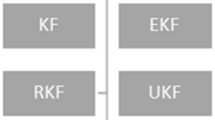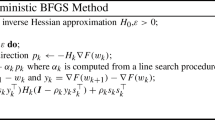Abstract
Block-oriented nonlinear systems have attracted a considerable attention for their flexible structure and practicability. This study proposes a novel multi-innovation stochastic gradient (MISG) algorithm to address the identification problem in input nonlinear systems. This involves applying the inexact line search strategy to determine an appropriate convergence factor at each recursive step. The proposed algorithm tracks the nonlinear system dynamics faster than the conventional MISG algorithm. It is therefore suitable for online identification and can be applied to nonlinear time-varying systems. The concept of auxiliary model identification is also adopted for dealing with unmeasurable variables. The effectiveness of the proposed algorithm is verified through simulated examples.



Similar content being viewed by others
References
L. Armijo, Minimization of functions having Lipschitz continuous first-partial derivatives. Pac. J. Math. 16(1), 1–3 (1966)
F.R. Avila, L.T. Duarte, L.W.P. Biscainho, On the sparsity-based identification and compensation of Hammerstein systems. IEEE Signal Process. Lett. 24(9), 1363–1367 (2017)
J. Chen, J. Li, Y.J. Liu, F. Ding, Gradient iterative algorithm for dual-rate nonlinear systems based on a novel particle filter. J. Frankl. I. 354(11), 4425–4437 (2017)
J. Chen, Y.J. Liu, X.H. Wang, Recursive least squares algorithm for nonlinear dual-rate systems using missing-output estimation model. Circuits Syst. Signal Process. 36(4), 1406–1425 (2016)
J. Guo, L.Y. Wang, G. Yin, Y.L. Zhao, J.F. Zhang, Identification of Wiener systems with quantized inputs and binary-valued output observations. Automatica 78, 280–286 (2017)
R. Havangi, Joint parameter and state estimation based on marginal particle filter and particle swarm optimization. Circuits Syst. Signal Process. 37(8), 3558–3575 (2018)
Y.B. Hu, B.L. Liu, Q. Zhou, A multi-innovation generalized extended stochastic gradient algorithm for output nonlinear autoregressive moving average systems. Appl. Math. Comput. 247, 218–224 (2014)
Y.J. Lu, B. Huang, S. Khatibisepehr, A variational Bayesian approach to robust identification of switched ARX models. IEEE Trans. Cybern. 46(12), 3195–3208 (2016)
J.P. Li, C.C. Hua, Y.G. Tang, X.P. Guan, A time-varying forgetting factor stochastic gradient combined with Kalman filter algorithm for parameter identification of dynamic systems. Nonlinear Dyn. 78(3), 1943–1952 (2014)
M.H. Li, X.M. Liu, F. Ding, The gradient-based iterative estimation algorithms for bilinear systems with autoregressive noise. Circuits Syst. Signal Process. 36(11), 4541–4568 (2017)
H. Li, Y. Shi, Robust H-infty filtering for nonlinear stochastic systems with uncertainties and random delays modeled by Markov chains. Automatica 48(1), 159–166 (2012)
D.D. Meng, Recursive least squares and multi-innovation gradient estimation algorithms for bilinear stochastic systems. Circuits Syst. Signal Process. 36(3), 1052–1065 (2017)
P.S. Pal, R. Kar, D. Mandal, S.P. Ghoshal, Parametric identification with performance assessment of Wiener systems using brain storm optimization algorithm. Circuits Syst. Signal Process. 36(8), 3143–3181 (2017)
J.B. Qiu, H. Tian, Q.G. Lu, H.J. Gao, Nonsynchronized robust filtering design for continuous-time T–S fuzzy affine dynamic systems based on piecewise Lyapunov functions. IEEE Trans. Cybern. 43(6), 1755–1766 (2013)
J.B. Qiu, Y.L. Wei, H.J. Gao, Reliable control of discrete-time piecewise-affine time-delay systems via output feedback. IEEE Trans. Reliab. 67(1), 79–91 (2018)
J.B. Qiu, Y.L. Wei, L.G. Wu, A novel approach to reliable control of piecewise affine systems with actuator faults. IEEE Trans. Circuits Syst. II Exp. Briefs 64(8), 957–961 (2017)
Q.Y. Shen, F. Ding, Least squares identification for Hammerstein multi-input multi-output systems based on the key-term separation technique. Circuits Syst. Signal Process. 35(10), 3745–3758 (2016)
Q.Y. Shen, F. Ding, Hierarchical multi-innovation extended stochastic gradient algorithms for input nonlinear multivariable OEMA systems by the key-term separation principle. Nonlinear Dyn. 85(1), 499–507 (2016)
Q.Y. Shen, F. Ding, Iterative identification methods for input nonlinear multivariable systems using the key-term separation principle. J. Frankl. I. 352(7), 2847–2865 (2015)
Y. Shi, J. Huang, B. Yu, Robust tracking control of networked control systems: application to a networked DC motor. IEEE Trans. Ind. Electr. 60(12), 5864–5874 (2013)
Y. Shi, B. Yu, Robust mixed H\_2/H\_infinity control of networked control systems with random time delays in both forward and backward communication links. Automatica 47(4), 754–760 (2011)
J. Vörös, Recursive identification of discrete-time nonlinear cascade systems with time-varying output hysteresis. Nonlinear Dyn. 87(2), 1427–1434 (2017)
X.Y. Yin, J.F. Liu, Distributed moving horizon state estimation of two-time-scale nonlinear systems. Automatica 79, 152–161 (2017)
X.Y. Yin, Z.J. Li, L.X. Zhang, M. Han, Distributed state estimation of sensor-network systems subject to Markovian channel switching with application to a chemical process. IEEE Trans. Syst. Man Cybern. Syst. 48(6), 864–874 (2018)
X.Q. Yang, W.L. Xiong, J.X. Ma, Z.Y. Wang, Robust identification of Wiener time-delay system with expectation–maximization algorithm. J. Frankl. I. 354(13), 5678–5693 (2017)
X.Y. Yin, L.X. Zhang, Y.Z. Zhu, C.H. Wang, Z.J. Li, Robust control of networked systems with variable communication capabilities and application to a semi-active suspension system. IEEE/ASME Trans. Mechatron. 21(4), 2097–2107 (2016)
X. Zhang, F. Ding, F.E. Alsaadi, T. Hayat, Recursive parameter identification of the dynamical models for bilinear state space systems. Nonlinear Dyn. 89(4), 2415–2429 (2017)
Acknowledgements
This work was supported by the National Natural Science Foundation of China (No. 61403165), the Natural Science Foundation for Colleges and Universities in Jiangsu Province (No. 16KJB120006) and the Research Fund of Jinling Institute of Technology for Advanced Talents (No. jit-b-201805).
Author information
Authors and Affiliations
Corresponding author
Rights and permissions
About this article
Cite this article
Shen, Q., Chen, J. & Ma, X. Multi-innovation Stochastic Gradient Algorithms for Input Nonlinear Time-Varying Systems Based on the Line Search Strategy. Circuits Syst Signal Process 38, 2023–2038 (2019). https://doi.org/10.1007/s00034-018-0963-9
Received:
Revised:
Accepted:
Published:
Issue Date:
DOI: https://doi.org/10.1007/s00034-018-0963-9




